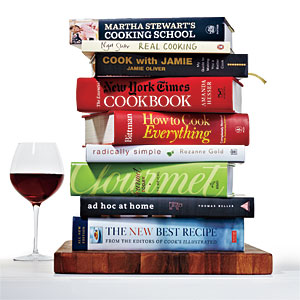by Carol Glassman
This could be a very dangerous year. I was looking through cookbooks, some new and some old, when a few titles caught my eye. The danger is dual: not only do I have an extra large collection of cookbooks, but I also tend to use them. Let me be more specific: I read them like novels when about to prepare a meal, canvassing several, taking the best from each, and then concocting my own version. On most occasions the results might be edible!
I’m immediately attracted to books about cooking Duck. That doesn’t mean, “Duck, I’m cooking.”
I like Duck Salad, but the last one I made inadvertently became Smoked Duck Salad. I intended to serve it for a large dinner party, before the main course, on New Year’s Eve. I fired up the barbecue, performed all the necessary functions, put the duck on the grill as usual, set a pan of water beneath to catch the grease, put the lid on, and went to finish preparations.
I noticed odd puffs of black smoke coming from the barbecue. It was windier and cooler than usual but this shouldn’t have affected my duck’s progress – I didn’t think. When I checked, the thermometer was correct but the thick black smoke pouring out the tiny air vent was daunting. Even though the lid should be left in place during cooking, I took a chance and peeked: there lay an ebony blackened duck. It still had another hour to cook – what should I do? (Run and buy one precooked?) “Leave it,” my cooking intuition said. “It’s raw inside.”
Reluctantly, I left it. When enough time had passed, I retrieved my black ball of duck and stared at it. When it was cool I debated giving it a bath or ditching it. No, more stringent measures were in order. I ‘peeled’ it. Amazingly enough, the inside (where I didn’t touch it with char-stained fingers) was pure white. Thus encouraged, I tasted a small sample. It was enough to make me wonder: could I char the duck like this each time? The salad was a roaring success. Only my trash can full of black duck skin knew the truth.
In the Land of Make Reservations for Dinner, there are several books encouraging ‘Rotisserie Chickens to the Rescue’. That should be a hit. Just think about what can be done with a pre-cooked bird, as long as you don’t try to pass it off as your own. There is no more recognizable flavor than a chicken from the supermarket or local delicatessen. In my opinion, roasting the hen is the easiest part. Now you get to prepare, slice and dice, and add all the other ingredients.
When I was young, my Dad conducted weekly marketing trips when we all piled into the car for visits to the butcher, the baker, the dairy, the fish market, and the poultry man. We visited a local green grocer more often and supermarkets were only for boxed items and cleaning supplies.
As much as I loved to eat chicken, I detested the place where we bought them. The unlucky fowl were caged in a storefront with no heat and a wooden floor covered with sawdust. After the customer chose his chickens, one swarthy fellow grabbed them by the feet and hauled them squawking to the rear lane where he performed his ritual. Thank goodness he removed most of the feathers before he returned to the back room where he lit a hand burner of some sort (a welding torch?) and singed the pinfeathers. When we got home, the chickens were still warm to the touch. We all knew the ceremony. Dad spread out the newspapers and proceeded to ‘clean the chickens’ while we took lessons in poultry anatomy. Patiently he named each part he removed and commented on its condition and function. It’s a wonder we didn’t become vegetarians! Nothing was wasted, from the tiny undeveloped eggs to liver, stomach and the feet, which we fought over once they were cooked in soup.
The first time I, as a newlywed, brought home a supermarket chicken and got ready to clean it before roasting, I was convinced I had been swindled. In agitation, I called my mother, reporting the ‘missing parts’. “Not everyone is as loony as your father,” she said. “Most people buy chickens that are already clean.”
How hard is it to roast a chicken? I guess the success of books like these will depend on the need not to prepare food from scratch.
Were you hooked on Fudge Ribbon Pie, Apple Dumplings, Cabbage Rolls, or New England Boiled Dinner? (I don’t think I could lick my lips over the last one!) There are books of ‘Endangered Recipes – Too Good to be Forgotten’ that may remind you of all the comfort foods you grew up with, but tossed aside for low fat, gluten/dairy free, no sugar/carb , no taste diets. No wonder you’re so stressed!
Do you like to dish the dirt along with a meal? You might have an appetite for ‘Dishing Hollywood’, cookbooks that retell Tinsel Town Tales and scandals, with a recipe for each one. You may read about Gary Cooper’s (whose?) numerous affairs and prowess while enjoying a plate full of his famous griddlecakes.
With shelves full of books, I might as well let my imagination take over and be intrigued by titles like, ‘Slow Cookers Do It In The Kitchen’, ‘101 Things to Do With A Cake Mix,’ and ‘How to Make Love and Dinner at the Same Time’. A book like ‘Dinner at Buckingham Palace: A Unique Collection of Recipes, Anecdotes and Tastes of the Royal Household’ wouldn’t get my second glance.
So many choices – so few good cooks. You can lead people to cookbooks, but that won’t make them chefs.

